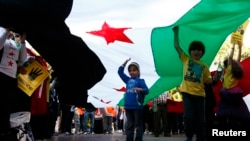International resettlement experts from seven countries are gathering in Sydney Wednesday to look at ways to help millions of people displaced by the war in Syria. The summit will also release the first results of a research project looking at how 12,000 refugees from the conflict have adapted to life in Australia.
A study funded by the Australian Research Council has tracked the lives of 200 Syrian and Iraqi families who have been resettled in the state of Queensland.
They were part of an emergency intake of refugees from the Syrian crisis, and arrived in Australia in 2016 and 2017.
The survey found that while most were happy to forge new lives in Australia, there was deep frustration at the lack of employment.
Jock Collins, a professor of social economics at the University of Technology Sydney Business School, was part of the research team.
“There is a frustration about work," he said. "They are very highly educated people; dentists, sort of pharmacists, engineers, major positions in multi-national corporations — strong achievements in a professional life. They are anxious to get going here and they find they have not been able to do that. There is a frustration about that. Basically, the key point is that getting a job is difficult but critical.”
Typically refugees in Australia suffer disproportionately high rates of unemployment. The University of Technology Sydney estimates that only about 17 percent of recently arrived refugees in Australia are working.
Community leaders worry that those statistics can influence the way the broader Australian community considers refugees.
Atem Atem, a Sudanese community leader who arrived in Australia in 2002, is a university graduate. He attended the Sydney resettlement summit and believes high rates of unemployment can stir negative perceptions of those fleeing persecution.
“If you are someone who lives in the suburbs and who has never met a refugee and you just hear refugee stories, which is the majority of the population then you think that we should not have refugees because they are hopeless," he said. "Those are the stories that you hear in the media and a lot of people who just get information from the media, which is the majority of the Australian population, believe that refugees are no good for Australia, that they are not contributing.”
Australia typically grants refugee visas to about 14,000 people each year through official humanitarian programs. Asylum seekers who arrive by boat have been detained in offshore camps run by Australia in the South Pacific. They have been told they will never be allowed to resettle in Australia under a strict policy designed to stop asylum seekers risking their lives at sea. Critics of the policy say it is inhumane and breaches international law.




